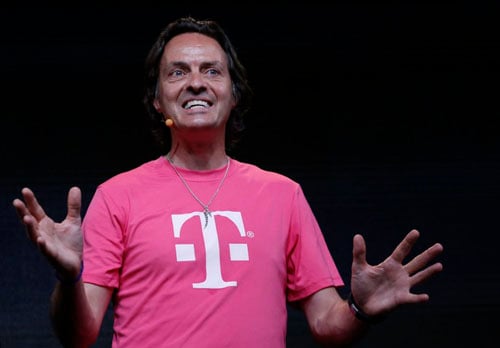T-Mobile CEO John Legere Says T-Mo Sprint Deal Will Challenge Verizon and AT&T 'Duopoly'
Like him or hate him, T-Mobile CEO John Legere is good for the mobile industry. He seems a little crazy, but crazy like a fox. The things he says in public are usually rather spot on, although his latest comments are more interesting if you read between the lines.
His company and Sprint are looking at a merger, which would take the number of major U.S. wireless carriers from 4 to 3. It seems on its face that such a merger would potentially be bad for consumers who would wind up with even further limited options in the wireless market, but Legere paints a different picture.
“We all need better scale and capability,” he told Emily Chang on “Bloomberg West”. “The question starts to be: How do you take the maverick and supercharge it? We either need more spectrum and capability and a lot more investment, or we need consolidation.”

On the surface what he’s saying is that something has to change in the wireless industry, and taking on the two bigger fish (AT&T and Verizon) by combining the efforts of the two smaller fish (Sprint and T-Mobile) is the way to do that.
That may be true, but he’s making a plea for “more spectrum and capability and a lot more investment” as an alternative to a merger. In essence, he’s putting out there that he’s up for either.
Perhaps we’re reading too much into his comment, but it would make sense. Legere’s efforts at the helm of T-Mobile almost seem like he’s trolling the status quo of the mobile industry. In the past six months or so alone, T-Mobile has offered a zero-down back-to-school deal; sued AT&T over the color of its Aio brand; expanded “home” data coverage to over 100 countries so users can roam internationally without absurd fees; offered 200MB per month of free tablet data for life; given free Facebook access with or without a data plan to prepaid users; and promised to pay your family’s early termination fee if you switch carriers.
It’s great for consumers, and it’s driving the competition nuts. For instance, in response to T-Mobile’s ETF deal, AT&T offered one that ostensibly is worth more money. Ironically, even as T-Mobile looks to take on what Legere calls a “duopoly” with a blockbuster merger, the company may be able to do more damage as the nimble “maverick” that it currently is.
His company and Sprint are looking at a merger, which would take the number of major U.S. wireless carriers from 4 to 3. It seems on its face that such a merger would potentially be bad for consumers who would wind up with even further limited options in the wireless market, but Legere paints a different picture.
“We all need better scale and capability,” he told Emily Chang on “Bloomberg West”. “The question starts to be: How do you take the maverick and supercharge it? We either need more spectrum and capability and a lot more investment, or we need consolidation.”

On the surface what he’s saying is that something has to change in the wireless industry, and taking on the two bigger fish (AT&T and Verizon) by combining the efforts of the two smaller fish (Sprint and T-Mobile) is the way to do that.
That may be true, but he’s making a plea for “more spectrum and capability and a lot more investment” as an alternative to a merger. In essence, he’s putting out there that he’s up for either.
Perhaps we’re reading too much into his comment, but it would make sense. Legere’s efforts at the helm of T-Mobile almost seem like he’s trolling the status quo of the mobile industry. In the past six months or so alone, T-Mobile has offered a zero-down back-to-school deal; sued AT&T over the color of its Aio brand; expanded “home” data coverage to over 100 countries so users can roam internationally without absurd fees; offered 200MB per month of free tablet data for life; given free Facebook access with or without a data plan to prepaid users; and promised to pay your family’s early termination fee if you switch carriers.
It’s great for consumers, and it’s driving the competition nuts. For instance, in response to T-Mobile’s ETF deal, AT&T offered one that ostensibly is worth more money. Ironically, even as T-Mobile looks to take on what Legere calls a “duopoly” with a blockbuster merger, the company may be able to do more damage as the nimble “maverick” that it currently is.

